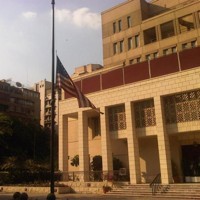Anti-American demonstrations turned violent Tuesday at the U.S. Embassy in Cairo, Egypt, and at the U.S. Consulate in Benghazi, Libya, where attacks killed Ambassador Christopher Stevens and three others. With similar protests now spreading throughout the region, the Defense Department, State Department and White House are working to step up security at embassies in the Middle East and around the world.
While the Vienna Convention on Diplomatic Relations holds the host country responsible for embassy security, the U.S. has established its own complex security bureaucracy to respond to ongoing threats. But in light of this week’s security breaches, diplomatic posts are reviewing and improving their security postures.
Melissa Dalton, a visiting fellow at the Center for a New American Security and a foreign affairs specialist in the Office of the Secretary of Defense, told Trend Lines that when it comes to the chain of command in U.S. embassy security, the ambassador, as the chief of mission, is the one “who makes the final call,” based on information from a team of advisers.

